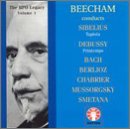| All Artists: Sibelius, Debussy, Berlioz, Beecham Title: Beecham Conducts Sibelius Debussy Berlioz 1946 Members Wishing: 0 Total Copies: 0 Label: Dutton Labs UK Release Date: 7/14/1998 Genres: Special Interest, Classical Styles: Marches, Opera & Classical Vocal, Forms & Genres, Symphonies, Theatrical, Incidental & Program Music, Historical Periods, Baroque (c.1600-1750), Modern, 20th, & 21st Century, Symphonies Number of Discs: 1 SwapaCD Credits: 1 UPC: 763587702728 |
Search - Sibelius, Debussy, Berlioz :: Beecham Conducts Sibelius Debussy Berlioz 1946
 | Sibelius, Debussy, Berlioz Beecham Conducts Sibelius Debussy Berlioz 1946 Genres: Special Interest, Classical
|
Larger Image |
CD Details |
CD ReviewsBeecham with a new orchestra and fresh sound from 1946-47 Santa Fe Listener | Santa Fe, NM USA | 03/15/2006 (5 out of 5 stars) "As restored by Michael Dutton, these early postwar recordings sound amazingly good, fully the equal of mono from the Fifties and without a trace of surface noise. Mr. Austin's review below makes it unnecessary for me to add much. Beecham's reputation had fallen under a cloud when he returned to England after the war--it didn't sit well that he had sat out the conflict in America. He competed with Walter Legge to see who would nab the best London musicians for the newly formed Royal Phil. and Philharmonia orchestras--they came out about equal, but the Philharmonia got a huge boost by scooping up Karajan as principal conductor, followed by Klemperer after Karajan decamped for Berlin permanently. Another label, BBC Legends, duplicates Beecham's Tapiola and Corsaire Over. in later concert readings, but these studio recordings sound much better, and I find them musically more satisfying, too. All these performances show the conductor at his best in off-kileter repertoire, the only fault being that the program consists entirely of bits and pieces about four min. long, except for the 17-min. Sibelius. That said, this is one of the very best Beecham historical reissues for anyone beginning to look into his extensive discography before the LP era." Beecham's RPO debut recordings. John Austin | Kangaroo Ground, Australia | 08/23/2003 (5 out of 5 stars) "In their day, most of these recordings had great significance. They were the first made by Sir Thomas Beecham conducting the last orchestra he founded, the Royal Philharmonic. All were works he had not previously recorded. Re-presenting them in CD format, Michael Dutton has added to them several that originally received only a limited release. The first recorded and issued was the "Corsair" Overture. A great favorite of Beecham's and a work I heard him conduct, it presents a corsair better behaved than the reckless, devil-may-care depictions in some of Beecham's later recorded performances - especially the one recorded live. Tapiola is similarly not quite so accurately characterized as in Beecham's later recording, although balance, ensemble and phrasing are faultless here. Introducing the Mussorgsky dance from "Khovanschina" is a long cor anglais solo from Leonard Brain, whose brother Dennis Brain was first horn player in all these recordings. Beecham lavishes great care on Debussy's "Printemps", an early work that nowhere reveals itself as being typical of this composer. The items from "The Bartered Bride" show how Beecham could create excitement without resorting to excessive speed. Beecham chose the recording of the Polka for inclusion in a broadcast where he was the featured celebrity introducing favorite recordings. It goes without saying that the Dutton transfers are superb, providing worthy reissues of some great recordings. 74 minutes."
|

 Track Listings (10) - Disc #1
Track Listings (10) - Disc #1